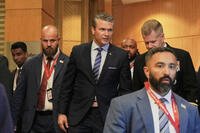While on a trip through the Asia-Pacific to meet with key allies, Defense Secretary Chuck Hagel told reporters that the ongoing government shutdown is adversely impacting U.S. military partnerships with allies in the region.
Calling the shutdown “completely irresponsible,” Hagel said the situation affects “our relationships around the world,” in a released statement. “It cuts straight to the obvious question: Can you rely on the United States to fulfill its commitments to its allies?”
During his recent trip to South Korea, Hagel did say the U.S. would preserve its commitments to security in the region and keep U.S. forces in South Korea and Japan. At the same time, South Korean officials repeatedly asked about the reason for the government shutdown, reports indicated.
The U.S. Navy's aircraft carrier, the USS George Washington, is currently conducting joint exercises with the South Korean Navy off the coast of South Korea, Navy officials said.
Meanwhile, Pentagon officials say scores of civilian linguists, regional specialists and policy experts have been furloughed, greatly impacting U.S. military relations with allies in the Pacific region and around the globe.
“We’ve taken a dramatic hit. The true experts for Asia policy are civilian workers. They speak the language and they know the intricacies. The shutdown has had a dramatic impact upon our capacity to do work in this realm,” said Pentagon spokesman Lt. Col. Jeffrey Pool.
The civilian policy experts are often the ones who maintain regular contact with counterparts from allied nations – so their current absence is substantially impacting the U.S. militaries’ ability to sustain partnerships, Pool explained.
“These are the people who help refine our policy and help work the day to day issues and engagements,” he said.
Pool also said that Pentagon officials are concerned that their expert colleagues are not currently being paid due to the political impasse.
“These people have lives and families,” Pool explained.
In addition, Pentagon officials are concerned that events like the ongoing government shutdown run may very well make it harder to attract and retain highly skilled policy and strategy experts, many of whom have Masters degrees and Phds.
“There is concern about the future impact of what this is going to do to recruiting – to attract these people who could easily work in the civilian world,” Pool added. “They could easily work for a larger corporation or think tank.”
With the Asia-Pacific region rapidly growing in strategic importance and the U.S. militaries’ Pacific rebalance strategy already underway, this is not a great time for allies in the region to begin questioning their confidence in the U.S., Pentagon officials said.
In fact, the U.S. militaries’ Asia-Pacific strategy specifically calls for stepped up coordination and collaboration with key regional allies such as South Korea, Japan, Australia and others.
In addition, the Navy’s Pacific reblance strategy calls for 60-percent of the fleet to be based in the region and up to 2,500 Marine Corps units to rotate through Darwin, Australia. The Navy will also rotate four of its now-in-development Littoral Combat Ships through Singapore, service officials said.
One analyst said the Pacific rebalance and U.S. military-to-military relationships with allies in the Pacific theater could be affected by the shutdown.
“Military-to-military exercises could potentially be curtailed but that is not the same things as maintaining alliances which are longer term,” said Benjamin Friedman, research fellow, defense and homeland security at the Cato Institute, a Washington, D.C. think tank.
Friedman also said the shutdown could have a negative impact on how the U.S. is viewed by key strategic partners around the globe.
“The way we’re looked at in the world is not irrelevant. This clown show that is going on in our country can’t be helpful to our ability to manage alliances,” he added.
While emphasizing that key alliances in the Pacific rebalance require important diplomacy, Friedman pointed out that the shutdown and furloughs at the State Department are likely to impact the equation as well.
“It is difficult to have this sort of collapse of our ability to run our country for reasons that are tough to understand overseas. The pivot to Asia is not just military effort but also a diplomatic effort which is more difficult due to the shutdown,” Friedman said.
Hagel called the shutdown a “dark cloud” of uncertainty.
“Here this great republic and democracy, the United States of America, shuts down its government. The Pentagon, even though we are exempted – our military – has no budget. We are still living under this dark cloud of uncertainty, not knowing what’s going to happen,” said Hagel according to the American Forces Press service.








